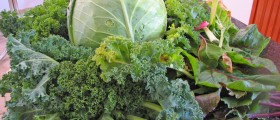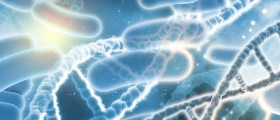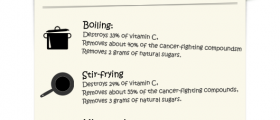There is a general misconception that all different types of raw vegetables are good for the health of human beings. They indeed are very beneficial in providing the human body with a vast array of precious nutrients, but only if they can be digested properly.
This is a problem that not a lot of people are actually aware of. It is very important to be able to choose the right vegetables because not all of them are that beneficial. Luckily enough, vegetables can be found in abundance everywhere on earth and they are very important in providing various different types of essential minerals and vitamins.

Raw Vegetables and Digestion
Another common misconception is that raw vegetables supposedly contain plenty of enzymes that are very efficient in enhancing the process of digestion. This could be true, but still there is an issue with all that. An average digestive system of an average person is unfortunately too weak to digest raw vegetables, so it does not actually matter if they contain the beneficial enzymes or not.
Further Complications
There are a large number of people who experience abdominal bloating, painful sensations in the abdomen, excess gas and other digestive distresses after eating any type of meal which includes raw vegetables. One should pay attention to all the consequences of consuming raw vegetables if there are any.
Poor digestion of raw vegetables is a rather common thing among a large number of people, but the popular belief dictates that the raw vegetables are actually very healthy. As mentioned before, most types of raw vegetables contain plenty of digestion-enhancing enzymes, but they also contain abundant amounts of cellulose.
Cellulose is a certain types of fiber which is very hard to digest. Fibers are not cherished because they have some exceptional nutritional value, they are helpful in forming a healthy stool and maintaining proper health of the intestines. The intestinal bacteria are responsible for producing cellulase, which is actually the type of enzyme required for the digestion of cellulose. This enzyme breaks the cellulose down into blood sugar.
- The majority of these assessed risk of oral, pharyngeal, laryngeal, esophageal, lung, gastric, and colorectal cancers.
- Most showed that vegetables, raw or cooked, were inversely related to these cancers. However, more consistent results were found for oral, pharyngeal, laryngeal, esophageal, and gastric cancers.
- Nine of the 11 studies of raw and cooked vegetables showed statistically significant inverse relationships of these cancers with raw vegetables, but only 4 with cooked vegetables.
- The few studies of breast, lung, and colorectal cancers also suggested an inverse relationship with both raw and cooked vegetables, but these results were less consistent.
- In the two studies of prostate cancer, there was no association with either raw or cooked vegetables. One of two bladder cancer studies found an inverse relationship with cooked, but not raw, vegetables.
- Possible mechanisms by which cooking affects the relationship between vegetables and cancer risk include changes in the availability of some nutrients, destruction of digestive enzymes, and alteration of the structure and digestibility of food.
Historical Facts
The traditional Chinese medicine, which dates back many centuries, shows that even in the ancient times of mankind, people were fully aware that it is hard to digest raw vegetables. Ever since then, it is strongly suggested that one should create a healthy inner ecosystem by eating foods which are very efficient in teaming up with the friendly bacteria located in the intestines.

















Your thoughts on this
Loading...